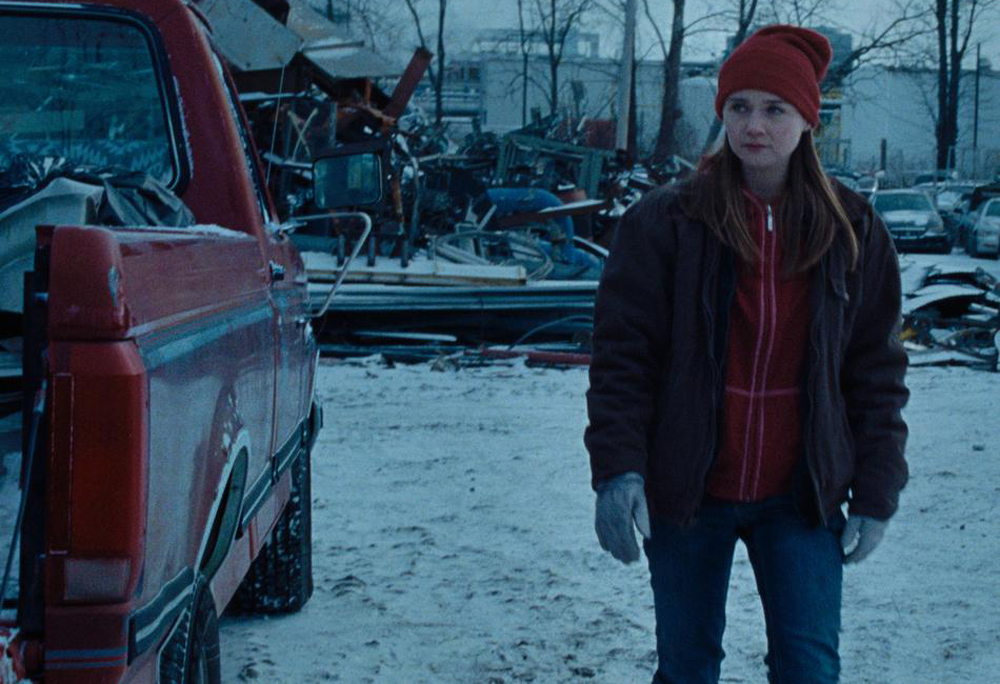At one point in “Holler,” a teacher asks Ruth (Jessica Barden) to stay after class, explaining why he won’t let her turn in her final term paper late, even if it means she won’t graduate. Granted, her attendance record is so spotty she can’t borrow books from the library, having to contemplate whether she can get away with sneaking off with something as weighty as “Madame Bovary” – she is gifted at calculations – but if it weren’t cruel enough that the teacher won’t relax the rules, it’s the additional limit he imposes upon her, suggesting that she attend a local IT school, knowing his friend is a recruiter there so she wouldn’t have to work hard.
A lack of imagination running through Ruth’s small town of Jackson becomes the real enemy in “Holler” as it holds the community from ever thinking they deserve better, but it’s not an affliction for the film’s writer/director Nicole Riegel, who crafts a compelling drama out of unexplored corners of economic downturn and finds ample rewards in discarded parts as readily as its heroine. While Riegel tackles an entire part of America that’s been left behind, impressively telling one story that speaks to multiple generations that have had less opportunity than the one that came before it, Ruth can only work with what’s in front of her, which happens to be aluminum cans. With her brother Blaze (Gus Halper), they cash in what they can at the local scrapyard, paid in bills that are as crumpled as what they turn in until the proprietor Hark (Austin Amelio) offers them a chance to make a few thousand a month hauling away unused materials from the many factories in the area that have gone under and selling it to eager buyers overseas.
The decision to take Hark up on his offer if it’ll pay the bills not all that difficult, with Ruth’s reasoning through of logic problems so elegant that it’s understandable there’s often sumptuous classical music accompaniment any time she’s observed thinking to herself. But figuring out other people is far harder, with Barden displaying a world-weariness well beyond her years as Ruth deals with a mother (Pamela Adlon) who lost her trust when she went to prison for her drug abuse, Hark, whose illicit activity should set off alarms if his actions didn’t make so much sense in the reality they face, and Linda (a standout Becky Ann Baker), a former co-worker of her mom’s at the local meatpacking plant who can be admired for her steely resolve and still somewhat pitied by Ruth in representing a future she doesn’t want. The only constant is Blaze, whose belief in Ruth exceeds how much faith she has in herself, and as the two get increasingly in over their heads pillaging abandoned companies with the goal of getting Ruth to college, the depth of their bond shines through as one can see the confidence that she projects to the world starts to fill in internally.
Although “Holler” runs a lean 90 minutes with a non-nonsense narrative drive, every scene arrives dynamically, visually conveyed with Dustin Lane’s curly cinematography that gets inside moments that can turn on a dime and becomes reflective of characters who don’t necessarily know what decisions they’ll make until their made, so precarious is their situation. The uncertainty adds to the film’s tension and energy, of course, but it also gives a humanity to the characters that’s as authentic and typically unseen on screen as any of the other elements Riegel wrangled from her native Ohio to appear in front of the camera, and for all the coveted metals that Ruth and Blaze throw into their pickup to make ends meet, it’s the film that emerges as something truly precious.
“Holler” will screen at the Deauville Film Festival on September 9th at 6:30 pm at the Casino, September 11th at 4 pm at the Casino and September 13th at 6:30 pm at the Morny.




